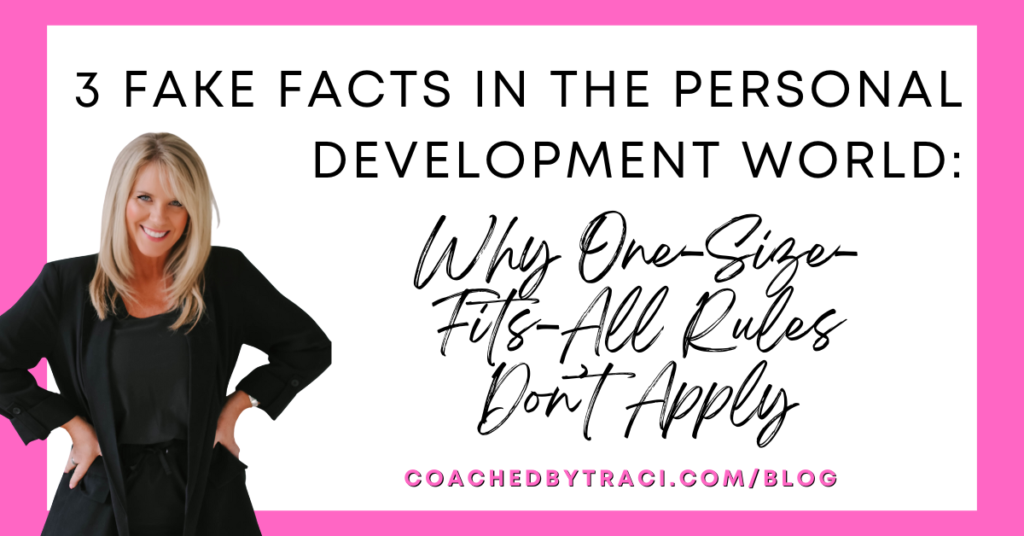As a coach who has helped hundreds of people over the past seven years reach their goals, I feel compelled to set the record straight about personal development. I have helped people from all over the world from all walks of life with different personality types reach their goals. And what I know to be true is that what motives one person does not motivate another. The morning routine that works for one person does not work for another. The positive affirmation works for one person does not work for another.

The personal development world is full of advice, some valuable and some misleading. Many tips are shared as non-negotiable “Golden Rules” for success, implying that if you don’t follow them precisely, you’re destined to fall short of your potential. But through years of working with diverse and successful business owners, I’ve seen firsthand that these “must-follow” principles aren’t always necessary—or even helpful. Here are three widespread myths that you don’t need to follow to achieve success and fulfillment.
Fake Fact #1: Success Requires a 4:00 AM Start
It seems like many productivity books these days claim that waking up at 4:00 AM is the secret to success. While early risers certainly find this routine valuable, it’s by no means essential for everyone. I work with several business owners who consider themselves night owls and find peak productivity in the late hours rather than the early morning. Even Tony Robbins, one of the world’s most renowned business and personal development icons, is a night owl who doesn’t follow the “wake up at 4:00 AM” trend.
What’s truly essential is discovering when you perform at your best and building your schedule around that. It’s about being intentional with your energy and productivity, not about the specific hour you begin your day. So, find your optimal rhythm, and define clear metrics for what success feels and looks like for you during those hours. Is your work flowing? Are you making meaningful progress on your goals? Those are better indicators of a successful routine than whether you’re up before sunrise.
Fake Fact #2: You Must Be Positive All the Time to Be Happy
Another widespread misconception is that positivity is the only path to happiness. Many self-help materials make it seem as though you should eliminate all negative emotions to live a joyful life. However, genuine happiness doesn’t mean ignoring or suppressing challenging emotions like frustration, sadness, or anger. In fact, acknowledging and processing these feelings is critical to personal growth and resilience.
Suppressing “negative” emotions can actually cause more harm than good by leaving unresolved issues lingering in your mind. The key is learning to engage with all your emotions, not just the positive ones. Experiencing tough times or challenging emotions allows you to appreciate the good moments even more. Authentic happiness isn’t a state of perpetual positivity; it’s a state of self-acceptance and awareness, where you allow yourself to feel a full range of emotions without judgment.
Fake Fact #3: There’s a “Right Way” to Set and Achieve Goals
Another myth that floats around personal development circles is that goal-setting should follow one specific structure, often using formulas like SMART (Specific, Measurable, Achievable, Relevant, Time-bound) or similar frameworks. While these methods are valuable, they don’t work for everyone. Some people flourish with detailed, time-bound goals, while others find such structures limiting or even stressful. Different personality types and working styles mean that people need different ways to define and achieve success.
What truly matters is identifying what motivates you and designing a goal-setting process that aligns with your unique mindset and workflow. This may mean breaking goals into small, manageable tasks for some, or keeping a looser vision with a general direction for others. Defining success on your own terms is far more effective than forcing yourself into a prescribed format.
The Bottom Line: Find What Works for You
The world of personal development is filled with tips that can feel restrictive if taken too literally. The most important takeaway is that success, happiness, and growth don’t come from following universal rules—they come from knowing yourself and finding what strategies resonate with you personally. Instead of blindly following one-size-fits-all advice, experiment and observe what truly helps you thrive. In the end, personal development is exactly that: personal.